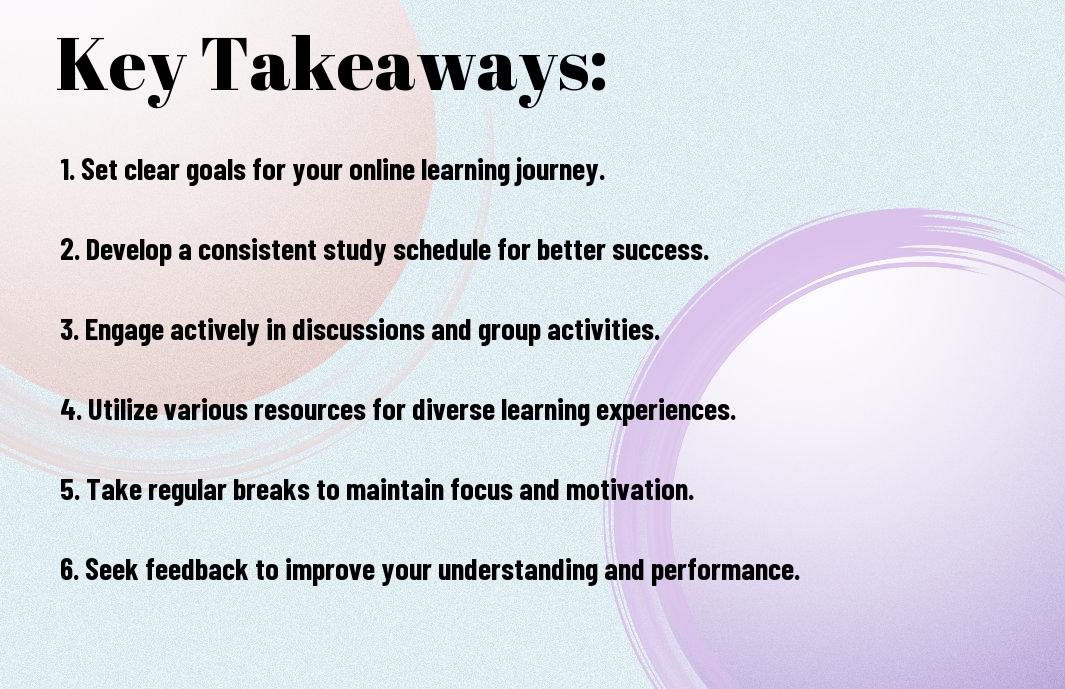You’re considering online education, and you want to know how to make it work for you. Your goal is to gain knowledge and skills that will enhance your career, and you’re looking for ways to succeed in an online learning environment. To achieve this, you can start by exploring resources such as 10 Tips to Make Online Learning Work for You, which will provide you with valuable insights to help you navigate your online education journey and ensure your success.
Key Takeaways:
To succeed in online education, consider the following points:
- Set clear goals and establish a dedicated study space to help you stay focused and motivated throughout your online course.
- Utilize technology tools such as video conferencing software, online forums, and mobile apps to enhance your learning experience and stay connected with instructors and peers.
- Develop a self-disciplined routine and create a schedule that allows you to balance online coursework with other responsibilities and activities.
- -svgTake advantage of flexibility in online education to learn at your own pace and access course materials at any time, from any location with an internet connection.
- Seek support from instructors, peers, and online resources to overcome challenges and stay engaged throughout your online learning journey.
Getting Started
To begin your online education journey, you’ll need to take the first steps towards creating a productive learning environment. You’ll want to consider your goals, available time, and the resources you’ll need to succeed. By doing so, you’ll set yourself up for success and be able to make the most of your online education experience.
Setting Up Your Online Learning Space
On the path to online learning, you’ll need a dedicated space that is quiet, comfortable, and free from distractions. On this space, you will be able to focus and engage with your course materials without interruptions, helping you to stay on track and achieve your goals.
Choosing the Right Online Courses
Beneath the surface of online education lies a wealth of course options, and you’ll need to choose the ones that align with your interests and goals. By doing so, you’ll be able to make the most of your time and energy, and set yourself up for success in your chosen field.
In fact, choosing the right online courses can make all the difference in your educational journey. You’ll want to consider factors such as the course content, instructor expertise, and level of support, as well as your own learning style and preferences. By taking the time to carefully select your courses, you’ll be able to create a personalized learning plan that meets your unique needs and helps you achieve your goals.

Creating a Study Routine
While establishing a study routine is imperative for online education, you need to consider your schedule and learning style. You should allocate specific times for studying, breaks, and leisure activities to maintain a balance in your life.
Time Management Strategies
Between scheduling and prioritizing tasks, you can effectively manage your time. You will be able to complete assignments and engage in discussions on time, which is vital for your online education.
Staying Motivated and Focused
Managing your distractions and minimizing procrastination will help you stay on track. You can achieve this by creating a conducive study environment and setting achievable goals for your online education.
Motivated by your goals, you will be able to push through challenges and stay focused on your objectives. You can celebrate your progress and accomplishments, which will help you maintain a positive attitude towards your online education, and you will be more likely to reach your full potential.
Effective Learning Techniques
All online learners need to develop strategies to stay engaged and motivated. You can achieve this by setting goals, creating a schedule, and tracking your progress. This will help you stay focused and make the most of your online education experience.
Active Learning Strategies
Leveraging interactive methods, you can reinforce your understanding of the material and retain information better. You can participate in discussions, ask questions, and engage with your peers to deepen your knowledge and stay interested in the subject matter.
Using Technology to Enhance Learning
For maximum benefit, you can utilize various digital tools to support your learning. You can access a wide range of resources, from video lectures to online quizzes, to enhance your understanding and stay on top of your coursework.
Actively incorporating technology into your learning routine, you can streamline your study process and make it more efficient. You can use apps to organize your notes, set reminders, and collaborate with your peers, all of which can help you achieve your academic goals and make the most of your online education experience.
Overcoming Challenges
After encountering obstacles in online education, you can find helpful resources to overcome them. For instance, you can visit 15 Tips to Succeed in an Online Class to gain insights on managing your online learning experience.
Managing Distractions and Procrastination
Besides staying focused, you need to minimize distractions and avoid procrastination by creating a conducive learning environment that promotes your productivity and motivation.
Seeking Help and Support
After identifying the challenges you face, you can seek help from your instructors, peers, or online support groups to address your concerns and stay on track with your online education.
But as you navigate the support systems available to you, consider how your unique learning style and needs can be met through personalized support, allowing you to optimize your online learning experience and achieve your academic goals.

Staying Organized
Keep your online education on track by prioritizing organization. You’ll need to manage your time effectively and stay on top of your coursework to succeed.
Keeping Track of Assignments and Deadlines
Beneath the surface of online learning, you’ll find that keeping track of assignments and deadlines is vital. You can use a planner or calendar to stay up-to-date on your coursework and submission deadlines.
Using Digital Tools to Stay Organized
Beyond traditional methods, you can utilize digital tools to stay organized. You can use apps and software to keep track of your assignments, deadlines, and progress, making it easier to manage your online education.
But as you explore the various digital tools available, you’ll find that some are more effective than others. You can use project management tools to break down large assignments into smaller tasks, set reminders, and track your progress, helping you stay organized and focused on your goals. By leveraging these tools, you can streamline your online learning experience and achieve greater success.
Evaluating Progress
Unlike traditional classroom settings, online education requires you to take a more proactive approach to tracking your progress. You need to regularly assess your understanding of the material and adjust your strategy accordingly to achieve your goals.
Assessing Your Learning Outcomes
Along the lines of your learning objectives, you should set clear benchmarks to measure your progress, allowing you to identify areas where you need improvement and adjust your approach to maximize your learning outcomes.
Adjusting Your Approach as Needed
For your online education to be successful, you need to be flexible and willing to make changes to your study routine, learning style, or even course selection if something is not working for you.
For instance, if you find that you are struggling with a particular subject, you may need to supplement your online coursework with additional resources, such as tutoring or study groups, to help you better understand the material and stay on track to meet your goals.
Final Words
To wrap up, you now have the tools to succeed in online education. You can make the most of your online learning experience by staying organized and motivated. For more tips on optimizing your online learning, visit How to Make Online Learning Work for You. By following these strategies, you will be able to achieve your academic goals and make the most of your online education, enhancing your skills and knowledge in the process, tailoring your education to fit your needs.
FAQ
Q: What are the basic requirements for online education and how can I prepare myself for it?
A: To make online education work for you, you need a stable internet connection, a computer or mobile device, and a quiet, dedicated learning space. Additionally, it’s vital to develop self-discipline and time management skills to stay motivated and keep up with the coursework. You should also familiarize yourself with the online learning platform and its tools, and don’t hesitate to reach out to instructors or support staff if you need help.
Q: How can I effectively engage with online course materials and interact with instructors and peers in a virtual environment?
A: Engaging with online course materials requires active participation, such as watching videos, reading texts, and completing assignments on time. To interact with instructors and peers, you can use discussion forums, live chats, and video conferencing tools. It’s also a good idea to join online study groups or find a study buddy to stay connected and motivated. Furthermore, don’t be afraid to ask questions or seek feedback from instructors, and be open to learning from your peers and their experiences.
Q: What strategies can I use to stay motivated and overcome common challenges in online learning, such as procrastination and lack of face-to-face interaction?
A: To stay motivated in online learning, set clear goals and deadlines, and break down larger tasks into smaller, manageable chunks. You can also use productivity tools, such as calendars and to-do lists, to stay organized and on track. Additionally, try to establish a routine and stick to it, and don’t be too hard on yourself if you encounter setbacks. To overcome the lack of face-to-face interaction, try to connect with your peers and instructors through social media or online communities, and participate in virtual events and webinars to expand your network and stay engaged.

